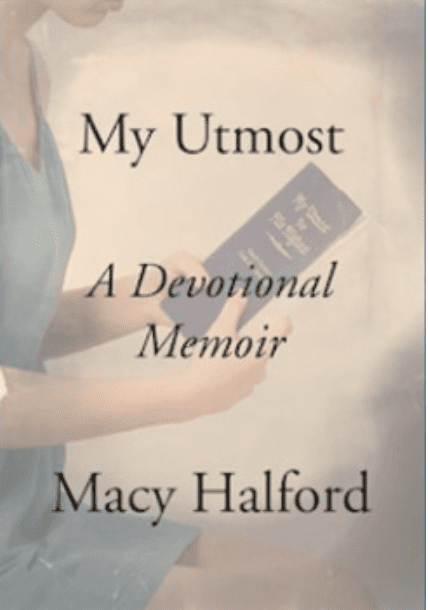On mornings like this, snuggled warm in bed with windows open to cool spring air and bird calls, I transport back to my childhood in Connecticut. Those early sensory experiences claim my memory like anchors dropped and never weighed. And yet…
“…you are not to spend your time in the smooth waters just inside the harbour bar, full of delight, but always moored; you have to get out through the harbour bar into the great deeps of God and begin to know yourself, begin to have spiritual discernment.” Oswald Chambers, “My Utmost for His Highest.”
Macy Halford grew up attending First Baptist Church in Dallas and listening to beloved evangelical pastor W. A. Criswell. As a teenager, she joined her grandmother and mother in reading Oswald Chambers’s daily devotional “My Utmost for His Highest.” Three anchors—church, family, and books—came into question as her world expanded during high school then college in New York City (Barnard) and work as an editor and book blogger for The New Yorker magazine. She felt uncomfortable among evangelicals and hid her faith from godless colleagues and friends.
“All believing people, if they do not turn back in fear, are bound, at one point or at many, to cross a line: the line between living their faith and considering it,” Halford wrote.
 The central issue of Halford’s My Utmost: A Devotional Memoir is this “complicated nostalgia” for the faith of her childhood. How could she reconcile her adult faith with a church whose policies she didn’t support? Why did others, so different ideologically, politically, and intellectually from her, love Chambers’s devotional as much as she did?
The central issue of Halford’s My Utmost: A Devotional Memoir is this “complicated nostalgia” for the faith of her childhood. How could she reconcile her adult faith with a church whose policies she didn’t support? Why did others, so different ideologically, politically, and intellectually from her, love Chambers’s devotional as much as she did?
In some ways, Halford dodged these questions; her “devotional memoir” is not actually devotional or a memoir. Instead, she wrote an intellectual and spiritual biography of Oswald Chambers, the author of “My Utmost for His Highest,” a favorite among evangelicals. By the end of her journey, she did find some answers to her initial questions by embracing what Paul wrote to the Corinthians, that we all must accept the mystery of division within unity. Halford might not have liked her childhood church anymore, but she retained her faith and love for family and books.
The New Yorker review: Books, March 27, 2014 and The New York Times book review, Feb 16, 2017.
Here at Vanaprastha, the sky has become overcast, this morning’s sweet feelings have dulled. “We must bring our commonplace life up to the standard revealed in the high hour,” Oswald Chambers wrote. “We have to learn to live in the grey day according to what we saw on the mount.” (April 16)
I think about weighing anchors, leaving safe harbors, the unmoored times of life. Some lose faith, some gain it, some deepen their relationship with God, and some remain the same. After reading her book, I’m not sure which of the last two categories applies to Macy Halford.
But I am reading “My Utmost for His Highest” every day now.



“A ship in harbor is safe, but that is not what ships are built for.”
–William Shedd
Love the quote – thanks for sharing.
Carol, “My Utmost for His His Highest” is wonderful—one of my favorites. I find it hard to land on a favorite. But this book had a BIG impact on my life 🙂
Oswald Chambers is new to me, as is faith, but clearly a favorite of many. Thanks for your comment. -C.D.